KNOWLEDGE
All About Common Personal Care Rigid Packaging
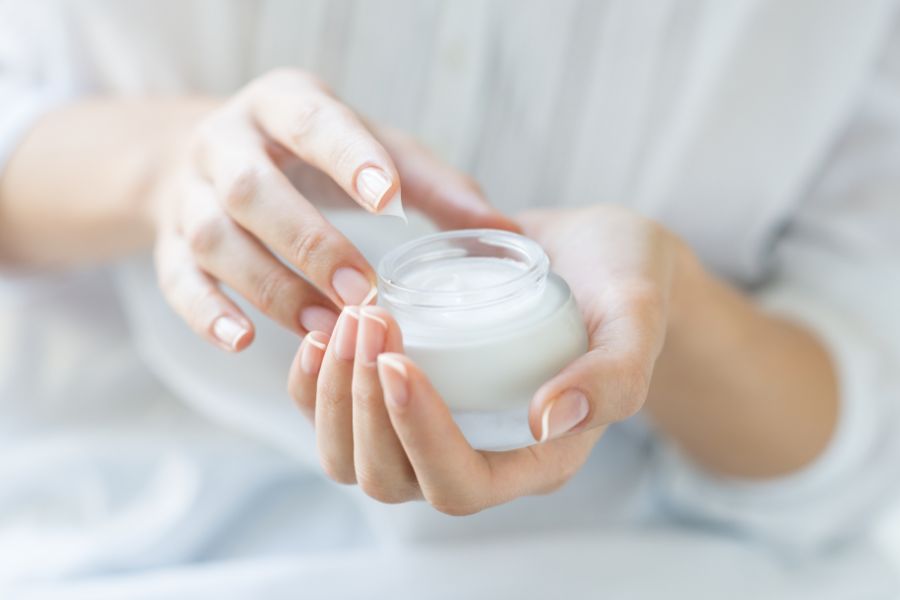
The personal care industry is a dynamic and expanding market with high expectations. A personal care product is defined as a product that is used on the body or in the home. For example, hair and skin care products, cosmetics, essential oils, perfumes, body sprays, and household products like candles and room sprays to name a few.
Whether it’s luxury brands or everyday drugstore items, careful consideration of personal care product packaging is essential. Rigid packaging offers a reliable solution, ensuring safe containment throughout the supply chain. In this article, we will explore common rigid packaging options used in the personal care industry.
What is Rigid Packaging?
Rigid packaging refers to product packaging that is made out of hard, inflexible materials like glass, hard plastic, metal, and even cardboard. Personal care products often use rigid packages because it helps keep products secure and offers many design benefits while appearing more luxurious or visually appealing to the customer. Some examples of rigid packaging include:
- Glass jars
- Plastic boxes
- Paper tubes
- Cardboard boxes
- Plastic bottles
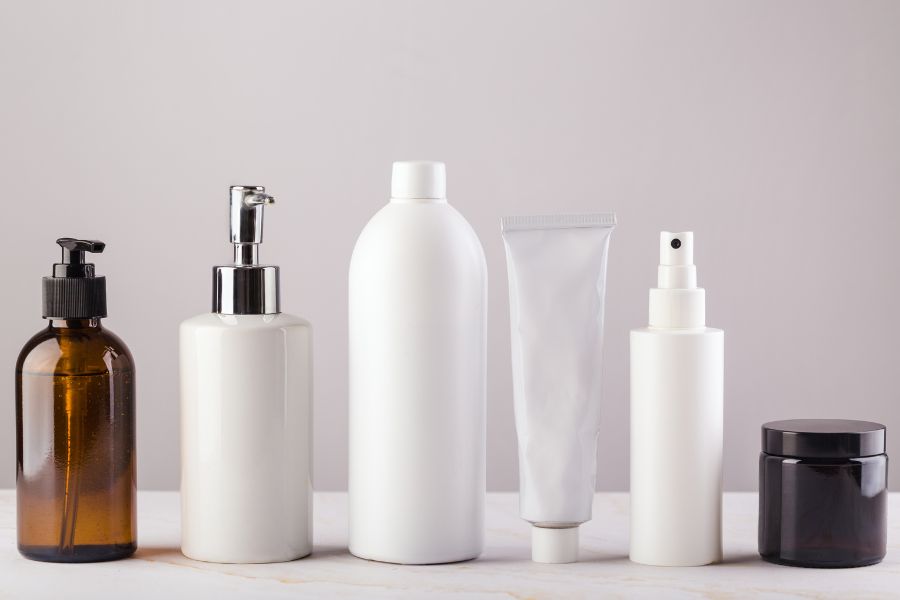
Benefits of Rigid Packaging in the Personal Care Industry
There are several reasons why personal care product manufacturers prefer using rigid packaging. The following are some of the main reasons why rigid has proven to be superior to flexible packages for the personal care industry.
Product Protection
Rigid packaging tends to provide better protection to products in the personal care industry. Rather than thin plastics that can easily get damaged or leak, rigid packaging helps keep personal care products protected. Rigid packaging also tends to last longer than a flexible package and in some cases the packaging is reusable making it even more appealing to customers.
Brand Differentiation
Rigid packaging gives companies the opportunity to create a more distinctive brand image. While many packaging options look fairly generic, having a distinctive glass bottle or metal container helps your product and brand stand out on the shelf. Another way to convey this distinction is through custom packaging or eye-catching packaging decoration. Many brands want to convey their products as luxury or high-end, and rigid packaging can help your company achieve this goal.
Sustainability
While it’s true that rigid packaging can be seen as less sustainable than flexible packaging, there’s more to it than that. A flexible pouch may not take as much energy to produce as a glass jar, but glass can be endlessly reused and recycled. Even though rigid plastic packaging does require more material and energy to produce, the plastics can be made out of recycled content and available from domestic suppliers. A majority of glass is produced overseas requiring more energy to transport leaving a heavier carbon footprint. Similarly, a hard plastic bottle or container can be recycled more easily than a soft plastic container that holds an oil-based or similarly messy product. The materials used in rigid packaging are easier to recycle than flexible packaging. So the question of sustainability really comes down to the values of your business and what sustainability means to you.
Convenience
Consumers often prefer the convenience of a rigid container due to the fact that it can be easier to use and store compared to its softer, flexible counterparts. Shipping and storing personal care products in rigid containers is more convenient because this packaging offers more product protection and if the shape allows, it can even be stacked to simplify the storage process.
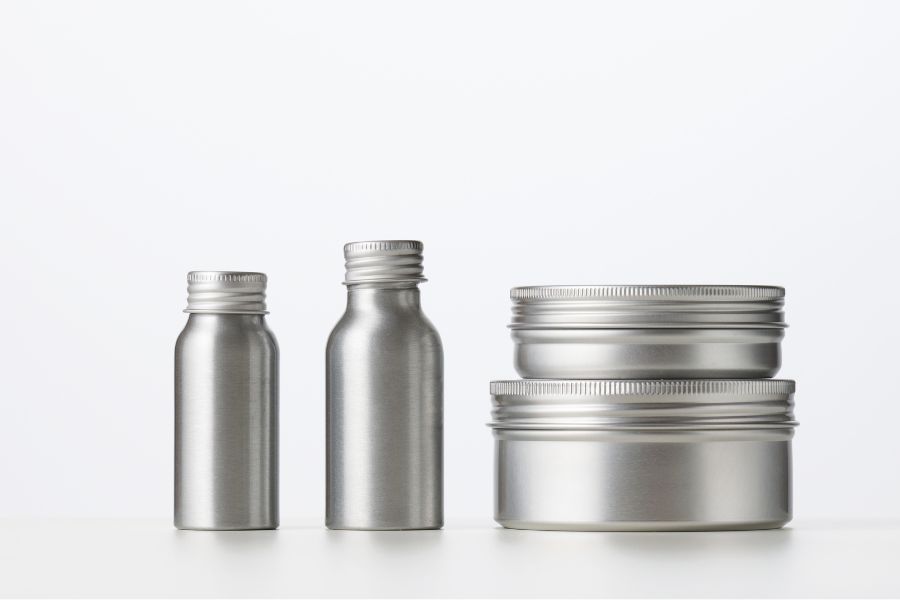
Common Rigid Packaging Materials Used in Personal Care
There are many materials that are used to create rigid packaging for personal care products, but the following list covers the most common materials used.
Glass Packaging
Glass is the most sought-after material for personal care and beauty products. It conveys luxury and displays well on retail shelves. Glass packaging is great for maintaining product quality and freshness. Its weight provides a sense of high-end durability, while an airtight seal can prevent contamination and keep the product fresh to help extend its shelf life.
Plastic Packaging
Plastic packaging may not immediately come to mind as a rigid type of packaging, but it can be manufactured in such a way. Many plastic bottles use less materials making them thinner and more flexible, but a rigid plastic container such as an acrylic jar can give the same impression as glass and be completely inflexible. Plastic is the most common material used for caps and closures. Plastic production is also easier and more cost-effective to transport than delicate glass which is heavy and can break easily. Rigid plastics can also be reused and recycled, making them a good option for sustainability initiatives.
Metal Packaging
Another type of rigid packaging material is metal. Metal can mean aluminum, tin plate, or steel, and is used in a variety of industries. While not yet as common as plastic or glass in the personal care industry, metal – or more specifically, aluminum – is growing in popularity due to its recyclability and unique look. Metal packaging can be used for liquid products like perfumes or shampoo. There are many lining options available as well to suit everything from personal care to food products. Additionally, a metal container is easy to store and ship and isn’t as fragile as glass can be, however, aluminum can be easily dented so it’s important to make sure the packages are well protected.
Paperboard Packaging
Paperboard or corrugated cardboard are other types of packaging material that can be classified as rigid. Paper tube packaging is used as a sustainable alternative to plastic for personal care products such as deodorant, lip balm or lipsticks, and SPF sticks. Paperboard can also be used to create boxes for shipping, individual package storage, and shelf displays. That makes it incredibly valuable for personal care and beauty product manufacturers.
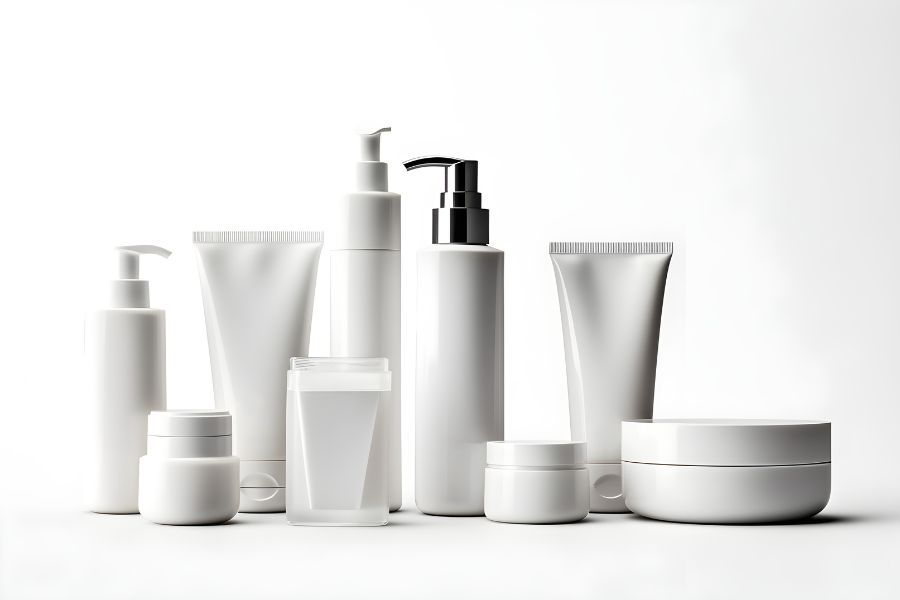
Personal Care Rigid Packaging Types
When seeking innovation and development in your product packaging, rigid containers come in a variety of shapes and sizes. The suitability of a particular container depends on the nature of the product being sold, particularly in the realm of personal care or beauty items. To make an informed decision for your business, here are some essential options to consider when selecting rigid packaging for your products.
Bottles
Bottles are a versatile and common container style that can be used for beauty and personal care products. A bottle can hold liquids, creams, or gels with a pump applicator or cap that opens at the top for products with a thicker viscosity to be dispensed manually. Bottles are also great for personal care products that are stored in different environments, such as showers or baths. Rigid plastic bottles are commonly used for products that you would store in the shower due to the hazard glass would pose to a person if it shattered.
Jars
Jars are another rigid option for products like waxes, creams, and lotions. Jars typically have a wider, more open neck than bottles, so they work well for products that don’t need applicators or pumps. If a product is meant to be scooped or handled by hand, then a jar is your best option for ease of use.
Tubes
Tubes are made out of various materials, and the general style that comes to mind when is a flexible tube that would hold SPF or lotion with a dispensing cap on it. This is not the type of tube that would be classified as rigid packaging. A rigid tube would be a cylinder-shaped package with a twisting mechanism on the bottom that services the product. These tubes are generally made from paper or plastic and contain personal care products like deodorant or lip balm.
Cans
While cans are more commonly used for food packaging, they can be found for personal care products as well. Think aerosol cans for hair care products or metal spray cans for sunscreen or body sprays.
Boxes
Rigid box packaging is not only utilized for shipping and storing large quantities of products but is also used in the personal care industry to hold individual items and provide an additional layer of security to protect the product inside. In many cases, a glass or plastic container is enclosed within the rigid box, creating an opportunity for the box itself to serve as a powerful branding and marketing tool for display purposes.
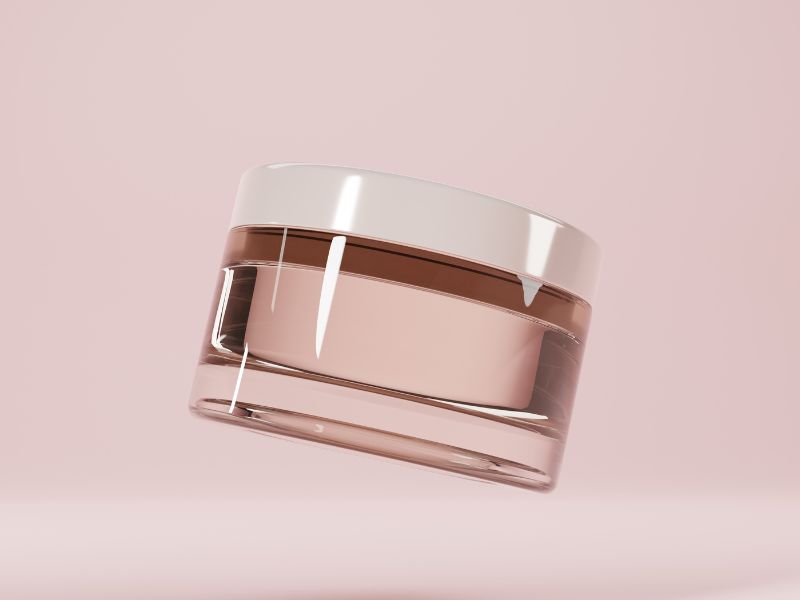
Rigid Packaging Design Considerations for Personal Care
Chances are if you are looking into rigid packaging for your personal care products, then you understand the value a rigid container can offer. It’s not just about aesthetics, although rigid packaging does provide more options for decoration. There are several factors to consider as you narrow down your packaging specifications. Let’s explore some of the key considerations to emphasize during the design process.
Size and Shape
Determine the appropriate amount of product per container and select the optimal size and shape for efficient storage. Aim for an attractive shelf display that catches consumers’ attention. Avoid containers that are too big or too small, as they may be easily overlooked by potential buyers. Your decisions in these aspects are vital for enhancing product visibility and market success.
Tamper Evident
Given that personal care products are intended for bodily use, ensuring consumer confidence in product integrity is paramount. Fortunately, there are a variety of tamper-evident solutions available for rigid packaging, such as foil seals, tape seals, or shrink bands. By incorporating these protective features, you can reassure customers that the product remains untampered, bolstering trust and satisfaction in your offerings.
Labeling and Printing
Effective packaging demands a clear presentation of product information and prominent branding. It’s essential to envision the desired design aesthetics and identify packaging solutions that align with your vision. What kind of finish do you want on your product? A glossy label or perhaps a matte finish? By carefully considering these factors, you can achieve a captivating design that resonates with your target audience and effectively communicates your brand message.
Protection
Personal care products vary in protection needs. For example, a thick cream may not require the same leakproof measures as an oil or liquid. Is your product sensitive to certain elements such as light or oxygen? Assess your product’s composition to determine the right safeguards to ensure that your product reaches consumers without any issues.
Sustainability and Recycling
Consider your company’s sustainability and recycling goals. Not all rigid materials are easily recyclable, but many are. Choosing materials that have PCR (post-consumer recycled) content and making design decisions such as keeping plastic natural or light-colored makes it easier to recycle. At the end of the day, you should be confident that your packaging aligns with your values and the promises you make to customers. Enabling consumers to easily make sustainable choices while minimizing waste is a smart decision in today’s era.
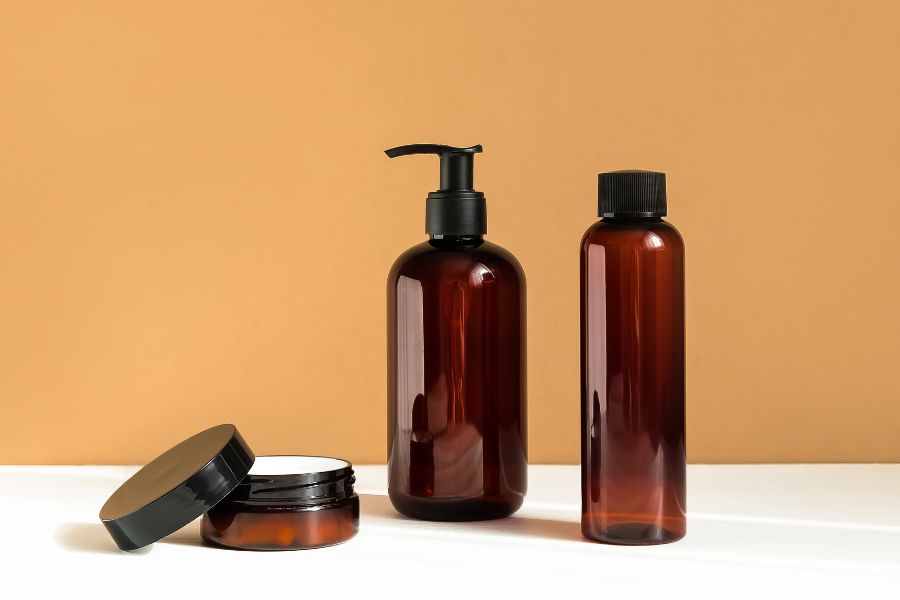
Pros and Cons of Rigid Packaging for Personal Care
Rigid packaging is a prevalent choice in the packaging industry, commonly used for personal care and beauty products as well as food items. However, it may not align with your brand’s vision. To assist in your decision-making process, here’s a concise list of pros and cons for your consideration.
Pros of Rigid Packaging
Below are some significant advantages of rigid packaging:
- Enhanced Protection: Rigid packaging offers superior product protection, safeguarding items from potential damage during handling and transit.
- Effortless Branding: Its sturdy surface provides an ideal canvas for seamless branding, enabling effective marketing and visual appeal.
- Robust Durability: Rigid materials ensure long-lasting and reliable packaging, maintaining product integrity throughout its lifecycle.
- Reusability Possibilities: Certain rigid packages can be reused, encouraging sustainability and reducing waste.
- Eco-friendly Solutions: Many rigid packaging options are environmentally friendly, contributing to sustainable practices.
- Versatility: Rigid packaging provides a wide array of options, accommodating diverse product shapes and sizes.
Cons of Rigid Packaging
Now, let’s examine the potential cons associated with rigid packaging:
- Environmental Impact: Rigid packaging may have a higher ecological footprint, posing challenges for eco-conscious brands.
- Higher Costs: The use of rigid materials can lead to increased packaging expenses, impacting overall production costs.
- Inconvenience for Travel: Rigid packages might prove cumbersome during travel, especially for on-the-go consumers.
- Limited Flexibility: Unlike more flexible packaging options such as pouches, rigid packaging may not be suitable for certain product types or shapes.
Protect Your Personal Care Products with a Rigid Packaging Solution Today
Choosing the ideal packaging solution is an essential aspect of the success of your personal care business. With a multitude of options available, the decision process can be daunting. Fortunately, you don’t have to handle it alone. Paramount Global is a leading expert in the packaging industry, and we’ve been partnering with businesses like yours since 1976. Discover how we can tailor a packaging strategy perfectly suited to your products, ensuring their protection and market appeal. Contact us today to learn more about how we can help you achieve your packaging goals.
Hayley is a marketing professional and copywriter with a background in crafting content for a diverse range of industries. She has been writing about packaging and supply chain logistics for Paramount Global since 2022. She specializes in explaining complex topics in a clear and engaging way and is an advocate for sustainability in packaging and supply chain management.
Read More
For over forty years, Paramount has been delivering perfectly integrated packaging and supply chain solutions.
